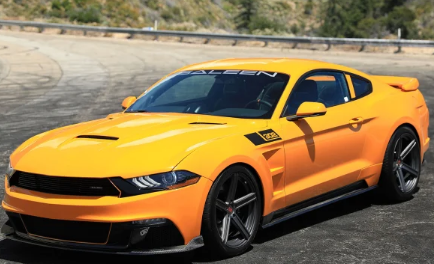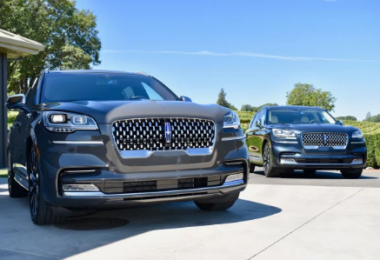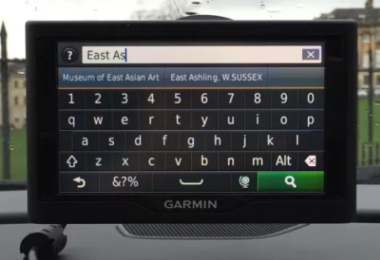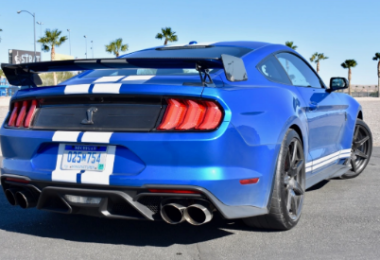Domestic factory performance was generally atrocious throughout the 1980s and far into the 1990s, with only a few notable exceptions. Automakers were forced in a chokehold by the one-two punch of emissions and fuel economy regulations, and they then tried their best to divert attention from the diminishing horsepower by introducing stripe packages, Corinthian leather, and other inexpensive marketing distractions.

The Big Three battled to engineer their way out of the hole year after year. With little to show for it, enthusiasts increasingly resorted to the aftermarket for their thrills, helping to pave the way for businesses like Saleen Automotive. Since 1983, the Corona, California, tuning shop has added their distinctive brand of performance to cars including the Ford Mustang, F-150 pickup, and Chevrolet Camaro. In 2000, they even produced the S7, a supercar covered in carbon fiber.
This Saleen 302 Black Label Mustang is their newest design. The Black Label, which is at the top of the company’s Mustang performance totem pole, offers a variety of cosmetic enhancements and numerous chassis modifications to go along with its supercharged engine. Saleen promotes the $78,495 as-tested pricing of the 800 horsepower vehicle as one of the best performance-per-dollar values available, and it does in fact provide more power than the Roush Stage 3 Mustang, which we examined earlier this year, despite costing a similar amount.
The stats, however, don’t necessarily represent the whole story, as we have often witnessed. Do tuner cars like this Saleen still have a place in the pantheon of performance when factory options like the forthcoming GT500 promise comparable levels of performance with OEM sophistication and refinement? To discover out, we snatched the keys to this Orange Fury-colored model and headed out into the open.
“Saleen’s best pony”
The 2019 Ford Mustang GT Premium with Equipment Group 400A is the base model under the Black Label. Saleen chose not to start with a Performance Pack 1-equipped GT, as Roush did, instead relying on their own hardware to restore the necessary balance with the significant increase in horsepower over the factory setup. The car’s features include heated and cooled leather seats and the Sync 3 infotainment system.
The Saleen’s drastically altered bodywork and this choice together determine much of the manner in which the vehicle will behave on the road. The Black Label has a ton of scoops and vents from stem to stern, and although it certainly has the appearance of a contemporary 800 horsepower muscle car, very few of them are truly functional. The heat extractors at the top of the hood are, however, and this is probably because a 2.6-liter blower made by Saleen that is nearly Hellcat Redeye-sized and capable of producing up to 12 psi of boost is hidden just below.
Saleen claims that the setup, which includes a 103mm throttle body and (we can presume) unique ECU tuning, produces 800 horsepower and 687 pound-feet of torque. A Saleen high performance exhaust system and an engine oil cooler are also added to the Black Label’s powertrain.
The Saleen comes equipped with a variety of scoops and vents, and it looks every bit the part of an 800 horsepower contemporary muscle car.
The Black Label’s chassis features a set of six-piston calipers and 15-inch discs up front to offer the necessary stopping power, while Racecraft springs at the front and back that are combined with Racecraft struts, shocks, and sway bars give the car its low stance.
The inside is filled with examples of Saleen’s craftsmanship, like the two-tone, alcantara-trimmed seats and white-faced gauges. Saleen’s addition of a short-throw shifter is a remarkable exception to that norm, even though the most of the changes are cosmetic.
Operating a vehicle
Although Saleen has built the 302 Black Label as a surefooted vehicle that is as confident in the twisties as it is in a straight line, that particular notion quickly fades from memory due to the aggressive aero parts and chassis improvements.
Although the rubber covering Saleen’s five-spoke wheels is a more heavy choice, they do look good. The 20-inch wheels are mounted with 275mm-wide tires at all four corners and have staggered widths of 9.5 inches in the front and 10.5 inches in the back. The tires were probably chosen because of the raked stance they create; they are General G-Max summer rubber with staggered sidewalls measuring 275/35R20 up front and 275/40R20 in the back.
At the very least, let’s hope so, as they aren’t exactly doing the handling any great favors. On an autocross, a factory-stock GT with Performance Pack 2 would outperform this vehicle while offering comparable levels of compliance (along with damper adjustability). The Saleen’s comfort-focused seats, which offer heating and ventilation but little in the way of lateral support, make it clear that this car was created for the driver who wants a fast straight-line machine rather than a sports car, even if the Racecraft suspension upgrades could make up the difference. And as long as the car is swift on a straight line, there is nothing wrong with that.
There is no doubt that the Mustang’s five-liter V8’s large blower on top makes the 800 horsepower Black Label a stoplight powerhouse. But in reality, there are a number of things that are against it from the beginning, and they begin with the powertrain itself.
Despite the fact that Ford added automatic rev matching to the six-speed gearbox for the 2019 model year (a feature that will probably increase the gearbox’s lifespan in this particular circumstance), the ratios are unchanged from stock, meaning they were built for a car with 460 horsepower rather than one with almost twice that amount. Because of this, whether you are caning the car or not, it frequently seems jittery in lower gears. With this much power, it also means that you have to change more frequently than you should, which actually slows the car down. Although that is a little frustrating, it is probably unrealistic to expect Saleen to replace the gearbox with one that is more tuned.
All over the cabin, from the two-tone chairs to the white-faced gauges, is evidence of Saleen’s craftsmanship.
The Saleen Black Label doesn’t deliver the reliable, consistent performance that is fair to expect. Despite not changing the throttle input during our time with the car, power levels would alter substantially. The numerous, seemingly random hiccups from the supercharged Coyote gradually reduced our faith in the vehicle.
Moments where we could fully utilize the Saleen’s potential were few and far between due to the engine’s nervous temperament and a factory traction control system that was completely unequipped to handle an extra 340 horsepower. The Black Label, however, proved to be a swift machine when everything was working, and Saleen’s unique exhaust system created an appropriate soundtrack.
The real price of uniqueness
The Saleen 302 Black Label Mustang, priced at $78,495 USD, might be one of the less expensive methods to reach 800 horsepower without getting your hands dirty, but expectations and reality in this case are completely unrelated. The Saleen Black Label is a prime example of the drawbacks that come with those restrictions because most tuners today simply cannot create performance vehicles to the same degree that an OEM can.
The starting price of a Dodge Challenger SRT Hellcat Redeye is $69,650 (or $75,650 with the Widebody option), and it comes with adjustable suspension, more mechanical grip, higher levels of comfort, more torque, and is unquestionably faster in a straight line than this Saleen. Although we haven’t had a chance to sit in the impending GT500, it’s safe to assume that it will have a similar set of advantages to the Saleen.
Saleen 302 Black Label for 2019
However, the Saleen does provide two advantages over those factory options: the choice to row your own gears, and exclusivity.
Three pedals are something we strongly support because they make operating a performance car more interesting. However, an automatic or dual-clutch transmission is going to deliver better results when we’re talking about a tuned muscle car that is focused on straight-line performance. This is especially true when you consider how out of sync the six-speed transmission’s ratios are with the car’s output, so the benefit is insignificant from a sensory perspective.
The possibility of the Saleen’s uniqueness is perhaps more important to potential customers. You probably won’t see another one at your local auto show, despite the fact that it has a great appearance and beautiful sound. Saleen will be pleased to put you in the driver’s seat of your very own Black Label Mustang (as well as the entry-level White Label or mid-range Yellow Label packages, if one of those better suits your needs and/or budget, if one of those does), if that appeals to you. It’s also important to point out that every new automobile sold by Saleen comes with a three-year, 36,000-mile warranty.
Do you need one?
No. The Saleen Black Label should be viewed as a cautionary tale about the dangers of chasing numbers for people who are more concerned with practical performance than attracting attention at Cars and Coffee.
You can also check 2020 Lincoln Aviator first drive review, price, and other things you need to know







